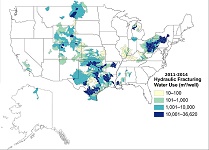
Small Community, Big ProblemWednesday, April 6, 2016 - by Water2Drink
Would you want your water source to contain diesel fuel?
How about having an unlined wastewater pond nearby that contains chemicals like
benzene and xylene? Fracking fluids in your morning beverage? A case study of a small Wyoming town reveals that
practices common in the fracking industry may have widespread impacts on
drinking water resources. Residents of
Pavillion, WY, had concerns when their drinking water became fouled in both
taste and odor. So they complained, and in 2011 the U.S. Environmental
Protection Agency issued a report that put the 231 residents directly in the
middle of the expanding debate over hydraulic fracturing, or as it is commonly
known, “fracking.”
“The EPA report, which linked shallow fracking to toxic
compounds in aquifers, was met with heavy criticism from the drilling industry
as well as state oil and gas regulators. Three years later, having never
finalized its findings, #EPA turned its investigation over to Wyoming. The
state released a series of reports without firm conclusions, and, as of last
month, has said it has no firm plans to take further action. In the meantime,
the federal Agency for Toxic Substances and Disease Registry has advised area
residents to avoid bathing, cooking or drinking with water from their taps,”
says an article in the Stanford News. On March 29, 2016, Stanford University published a new study in Environmental Science & Technology
that finds the Pavillion #fracking operations “have had clear impact to
underground sources of drinking water.”
While this is only one community’s story, there are
myriad news articles and information indicating that fracking creates
widespread impact to our underground water supply. As Rob Jackson, Co-author of
the #Stanford study, states, “There are no rules that would stop a company from
doing this anywhere else.” Jackson also
states, “The EPA has consistently walked away from investigations where people
and the environment appear to have been harmed" by fracking's impact on
groundwater.” And lead author Dominic
DiGiulio adds, "This is a wake-up call.
It's perfectly legal to inject stimulation fluids into underground
drinking water resources. This may be causing widespread impacts on drinking
water resources."
The only way to ensure your water source is protected
against fracking fluids that are a toxic mix of chemicals, fuels, and acids, is
to use a point-of-use water filter such as a Multipure Drinking Water
System. Each member of the Multipure family
of Drinking Water Systems employs submicron (0.5 micron) solid carbon block
technology that uses mechanical filtration, electrokinetic adsorption and
chemical/physical adsorption processes.
The #carbon filtration performance is independently tested and certified
by NSF International. Every #Multipure Drinking Water System also comes with
its own Performance Data Sheet, which lists contaminants and the percent of
reduction of each.
|
|
Tweet
|
Leave a Comment


 Comments
Comments